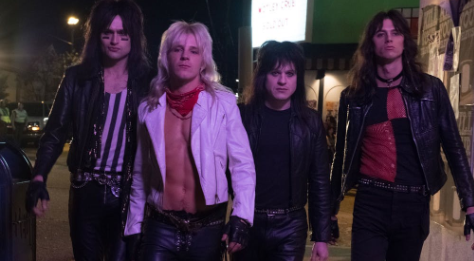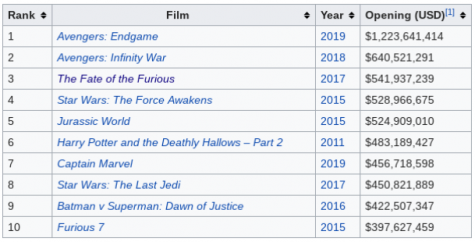Music Movie Trend Shows Hollywood’s Continuing Struggle to Find Originality

A Netflix Original biopic chronicling the wild career of Mötley Crüe exposes the flaws in a new cinematic movement.
May 28, 2019
Everyone knows that selling tickets to see movies in theaters has become an increasingly difficult task these days. The growth of streaming services and alternate ways to consume cinematic entertainment that more easily satisfies the laziness of the American audience has pushed companies to take new marketing measures and appeal to pull in an audience and sell those tickets.
The notable trend of record-setting opening weekends in the last five years or so has suggested that these measures have been taken — and when you look at what those record-setting films have in common, it is clear what the strategy is.

List of highest-grossing openings for films.
All of these films are part of larger franchises that boast widely successful series. In fact, it takes until #48 on this list for a standalone movie that is not based off of anything to appear, and ironically it soon after inspired a blockbuster franchise of its own (2009’s Avatar).
Currently, the movie market finds refuge and a sole spot in reliable success on franchises — which now practically make up the entire market. Companies know that they can use characters the public loves to tell a story people will want to, or even need to hear. When is the last time you saw a movie in theaters that was not a piece of a larger storyline or cinematic universe?
Of course, this is fun at times for moviegoers and franchise fans — but it has its side effects.
For every film that lives up to the hype and becomes an instant classic, there is a disappointment and poor use of the franchise’s beloved assets, and regardless of what you think, they already have made millions off of the hype you bought into. Some of the films in the above listings were divisive (to say the least) despite their record-breaking financial success.
This franchise-focused environment also promotes a lack of originality that is quite notable. When writers are trapped in these sets of expectations that prexist production of new franchise films, it breeds some serious repetition that abuses the power the franchises hold over their captivated die-hard fans.
In some scenarios, the fitting closure of a series has been corrupted by a re-opening of the story in this modern era on the basis of little other than profitability. To the surprise of many for example, Disney Pixar made the recent decision to continue the Toy Story series despite a quite conclusive end to a well-rounded trilogy, in an upcoming Toy Story 4. Sadly, scenarios like this cheapen the stories themselves in favor of monetary gain.
The repeated trend of these franchise spectacles on opening weekend pretty easily mirrors this trend of not only musical biopics themselves, but all of the aspects in the film that began the trend, unfortunately including its flaws.
While the legitimacy of Bohemian Rhapsody’s impact and success should be recognized, there are plenty of shortcomings that should be noted — including a variety of historical liberties and simplications taken, some of which crossing the line as severe problems with the production that should be widely exposed.
To put it simply — the story of both Queen and Freddie Mercury’s life that is told in the film is nowhere close to the true story. The list of reasons goes on and on.
These inaccuracies include the glossing over of John Deacon being the fourth bassist in the band, the Live Aid performance’s place in Queen’s history as part of an ongoing tour and not an epic reunion as the movie portrays, and most importantly, the discovery of the real Mercury’s HIV at least a year following Live Aid, as opposed to the discovery on film that was prior to the performance, catapulting the moment to a Hollywood climax.
While historical inaccuracies and rearrangements are not something that is brand new to the industry of “based on a true story” productions, and the stance that Bohemian Rhapsody writer Anthony McCarten summarizes in the quote “it’s a movie, not a documentary” can be well defended, the damage that this habit can have on this specific trend may be far more severe.
The other films in this “wave” of biopics carry the similar characteristic. Netflix’s original film The Dirt swiftly contradicts the prevalent record label issues that followed the career of Mötley Crüe. Even in the upcoming Elton John film Rocketman, the protagonist reportedly performs his hit “Crocodile Rock” in a notable concert scene that takes place in an era predating the single’s release.

Rocketman tells the tale of Elton John in Paramount’s contribution to this new Hollywood trend.
Of course, this occurrence in a film that has ties elsewhere is far from uncommon — the phrase “the book was better” exists for a reason. However, what was once a common directing decision of films can now be weaponized by brands in the world of music to effectively change the textbook of history.
Many films like these are soon to release, and many films are in production. Soon enough, any rock band that is anyone will have a film of their own. Considering the widespread display that viewers simply don’t care about the inaccuracies, they have been given the green light to mess with history to create their own polished narrative of their history and musical legacy.
It won’t be long until every major artist that you can think of abandons their unique spot in history to each become the “greatest artists of all time” in their respective films.
While this may be fun and nostalgic for the time being, this narrative will ultimately strike as repetitive and boring among viewers, as production companies continuously cash out on their loyalty to the characters they love and need to hear from, in ultimately cheapened stories told for monetary gain — this time, however, in the new open field of music “franchises”.







